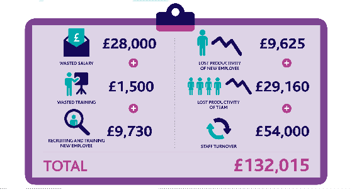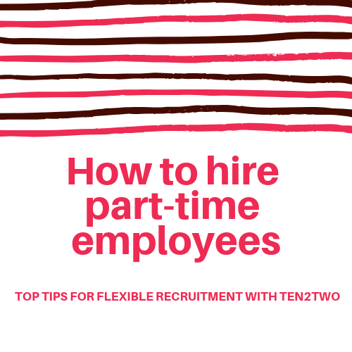What Does It Cost To Recruit Someone?
Recruitment costs might be one of the single biggest things that stop small and medium sized businesses from growing. Did you know that? Teams that have reached their natural capacity and still want to grow often struggle on far longer than they need to, before admitting that they need to spend the money on hiring another person and expanding the team.
But why?
Why do we think recruitment costs so much, and is there a way to get all the benefits of a new team member, without that high price tag? The short answer is yes, you absolutely can! And for the long answer, you will need to read on.
Full-Time Recruitment Costs
Unsurprisingly, recruiting a full-time member of staff is one of the most expensive parts of running a business. There are a number of different costs you need to bear in mind here, from recruitment fees to training cost (which is also part of the cost of recruitment). To put it in perspective, here’s a breakdown of some of the most common costs associated with a new hire in the UK in recruitment, and year 1 expenses.
- Recruitment fees (outsourced): Generally, recruitment agencies will take a percentage fee of your new employee’s final salary. This is usually around 20-30%, so on the average salary this would be over £5,000.
- Recruitment fees (DIY): Of course, you could go the DIY route with your hiring (though we explain why that’s a bad idea in this blog), using social media and job sites. This usually costs around £200-£400 if you use LinkedIn and one job site – along with the cost of your time to manage it all.
- Salary: Obviously this is the big cost, and the salary you offer very much depends on the experience you’re looking for, what level you’re hiring at and the contract specifics – but you can assume it’ll be in the tens of thousands. To give us a rough idea, the average full-time salary at the moment is around £27,600.
- Bonuses: Not all companies pay bonuses, but it’s a great way to boost performance and employee retention, so a lot are coming round to the idea. If you do, Government figures put the average bonus at around 6% of total annual pay, so around £1,656.
- National Insurance: Every employer has to pay towards all full-time employees National Insurance. The standard rate for Class 1 NI is 12.8% of total pay, including bonuses and any overtime. If we’re taking the average salary and bonus, this comes in at around £1,656.
- Pension: Since auto-enrolment came into force, employees are automatically signed up to the basic company pension scheme – so employers will need to pay a minimum 3% of each employees monthly salary towards a pension – which comes to around £828.
- Training: Whether you choose in-house training or offer funding towards external training, you will still need to train your new hire, and refresh that training in the future. The average UK company spends around £1,000 per employee on training.
- Miscellaneous costs: And of course, there’s everything else. Things like office space, equipment, HR costs to deal with new starters, holiday, maternity and sick cover, company cars, software licenses and more. All in, the miscellaneous extras can come to around £12,000.
Total: Around £50,000. Or in other words – OUCH.
So even though you might think you only need to put aside the salary for your new employee, the reality for a single full-time employee is much higher.
What About Part-Time, or Flexible Roles?
So now you know how much it will cost, roughly, to hire a full-time employee for your business. It’s a bit of an eye-opener, right? But the mistake a lot of business owners make is thinking that’s the only option they have – when there is another option.
You could hire someone part-time, or on a flexible basis.
You (hopefully) already know that part-time and flexi-roles exist, so why not consider them for your business? Often, you will find that the role you’re recruiting for could be done equally effectively by a part-time/part-week employee, which means the business would be spending significantly less on recruitment, and ongoing employment costs, and seeing all of the benefits – over half as much in some cases.
Which means you could still get that talented new team member, and only pay around £25,000 instead.
To break it down, hiring someone part-time or on a flexible basis does still include all of the same costs, but they are much less, because there are fewer hours, a smaller salary, and therefore less to pay in terms of NI contributions (in fact, this cost could disappear completely), pension and more. And with so many people stepping back (or being made redundant) from corporate jobs, looking to use their skills in smaller businesses, where they can really see the difference they make, there has never been a better time to go the part-time route with your recruitment.
At Ten2Two, we specialise in helping businesses fulfil their needs with part-time or flexible roles. With our help, you could have a brand new, highly qualified employee on your team, with more skills, and at a fraction of the cost of a full-time hire. Sound interesting? Get in touch with the team to find out how it’s possible.


 Back to resources
Back to resources 5 min read
5 min read








